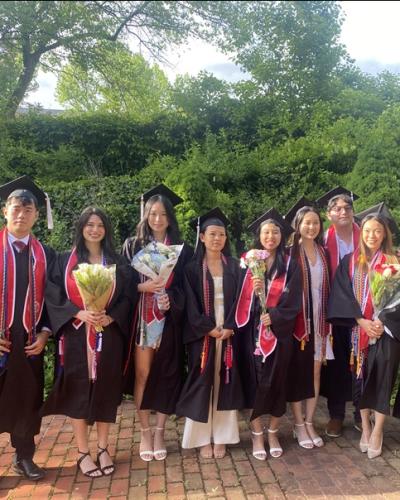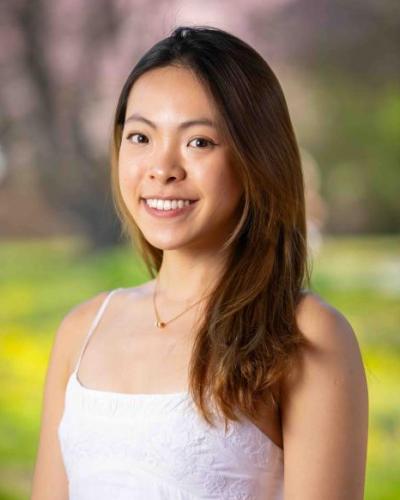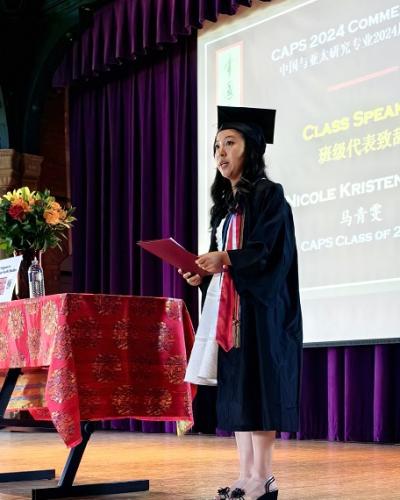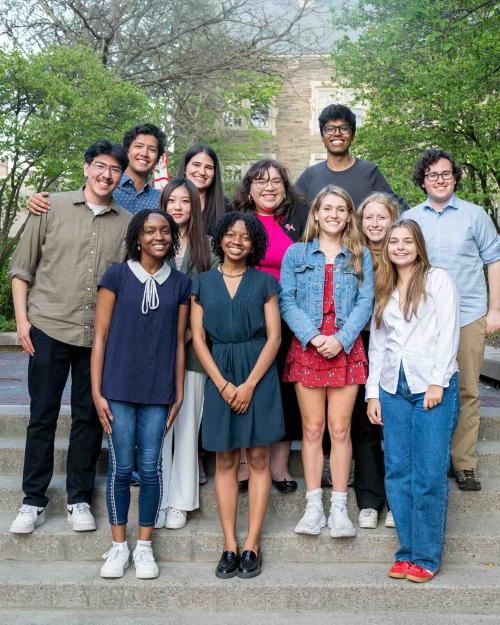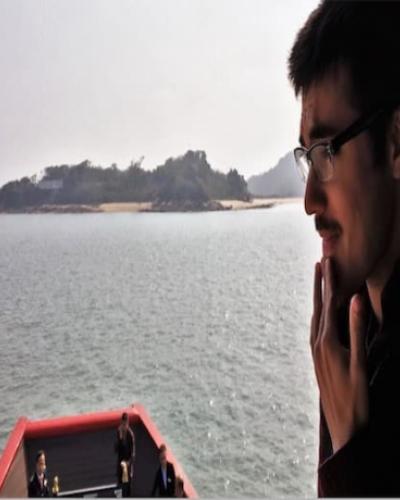Editor’s note: Niall Chithelen graduated from Cornell in May as a double major in CAPS and History, with distinction in all subjects, and was also the recipient of the CAPS’ 2018 Sherman Cochran Prize.
He was selected by his classmates to present the student address at the CAPS 2018 Commencement Ceremony in Barnes Hall Auditorium.
Thank you faculty, staff, family and friends for coming today. I am honored to have this opportunity to speak before you today and to as a member of the Class of 2018.
Since we’re all members of the CAPS program, I think it’s fair to say we’re all quite familiar with doing work. Classwork, internships, reading, writing, studying, researching… that sort of thing. Being a CAPS major specifically, I’ve spent a lot of time doing work on China. Like all of us, I’ve taken some classes, taken a lot of tests, done some research, and studied the language. That’s how majors usually go.
These things, however, the work that dominated my school life at Cornell, only peek around the edges of the CAPS program. The CAPS major isn’t necessarily special yet when you’re just a person who takes a lot of government classes about China; then you’re just the person in the gov class who is supposed to be an expert, because it’s your major, and really you’re not an expert because you’re a sophomore in college or whatever and you have heard of but are not sure why you’re supposed to know who Hu Yaobang was.
When the CAPS major becomes special is when you sit down next to another CAPS major in a taxi at around 4am, headed to the Beijing airport, and you look at the people around you and realize that this is strange, that maybe you didn’t really know them before, but they’re your lifelines here, and you will probably eat a lot of meals together and you will ask each other questions you never asked anyone else before, and you do that and become a unique sort of friends, and then you’ll go back to the US a few months later and you’ll be in different classes and different friend groups, but at that point, you’ll really be a CAPS major, and that’s when it’s something that you cannot take away from us, something truly special.
It might be fair to say, then, that the CAPS experience is larger than the CAPS major alone, and none of us just happened into being a part of CAPS, but we also never planned for exactly what that would mean.
There is something large at the other end of both the CAPS major and experience, and, of course, that’s China. The main function of CAPS, I think, is to break China down until it becomes the overwhelming and really untouchable collection of cities, ideas, markets, bureaucracies, history, and most importantly, people, that it really is. The CAPS professors have not given us the tools to make China easy, because China isn’t easy. From gateway courses to the senior seminar, we have constantly been shown just how complicated a place it is we chose to study. But if I can ask something of myself and the other CAPS graduates today, it is this: please keep China messy and impossible, even if it’s just in your mind. We’ll all be asked countless times in the coming years to make sense of China or to explain something that is happening there, and it is a great power of the CAPS major that we will be able to think for a second and then try to do so.
But at the same time, I don’t ever want to forget all of the memories in China, even—or perhaps especially—if they were small moments like conversations with a taxi driver about his hometown seven hundred miles away, because these moments added so many shades to our vision of the country. We all will be doing different things in the future, but when we think of or go back to China we will feel a similar nostalgia for the experiences that we’ve had there, and that nostalgia has a power to keep us from hasty decisions and judgments. From Professor Mertha, we know likely better than any other undergraduates in the country how the Chinese state works, and we know from our research and studies that the state makes its way into people’s lives in ways that are confusing, often invisible, and often terrifying.
But so much of this complication is clear even from one of the many long bus rides we took last year—I’ve probably read thousands of loud red and white propaganda posters around Chinese cities, and I see pictures of them all the time in the news, but I have never heard a single person say the words on those posters out loud. It’s not easy to make sense of that for me, and I don’t think it should should be. In a way, the CAPS major helps us explain China, but the CAPS experience lingers in our minds whenever we try to make that explanation definitive.
Now, there’s something I’ve noticed about this weekend, commencement weekend, and it’s that this weekend doesn’t feel quite like Cornell, and it certainly doesn’t feel quite like CAPS. This weekend, we’re surrounded by people we’re deeply comfortable with in our own ways—even if your family members drive you crazy, that feeling is probably one of the most familiar feelings to you in the world. What I’ve noticed, though, is that that there’s a weird effect when that familiarity meets with everything at Cornell. This weekend is showing us the ways that we’ve created our own version of familiarity and home here.
To some extent, that’s exactly what we came here to do. Beyond professional and academic successes, we came here to find a community, and we found CAPS, where from professors down to seniors and now down to freshmen, we know each other’s names and faces, and we share feelings of companionship, stewardship, admiration, and a deep dedication that binds us through all that makes every CAPS major different. We’re here first because of the people that love and support us, and indeed my family and friends have are and have always been everything, and I would be so much nothing without all of you, and I don’t and can never tell you that enough. We’re also here because we believed in ourselves and each other and we sought to study and love a country that it is far too easy to know so little about.
Ultimately, this program, that is, our community here, is nothing but the people that comprise it and support it. I feel familiar enough with everyone here to say that those people—you all—are amazing. To the professors and program coordinators, you work and meet and ask questions and study and travel repeatedly across the world so that you can keep the CAPS major going and improve it for students to come, and I just want to say to all of you that it works, and you changed our lives, and thank you.
Now I too feel committed to helping future CAPS students for the rest of my life and I feel proud already of what I know they will accomplish. I’ve met the juniors and sophomores and freshmen and they are passionate and inspiring, and they are so dedicated and smart that I’m pretty seriously concerned they will take my job whenever I get a real one.
And finally, I admire my friends graduating today here so much and I feel a sense of hope, a sort of small, luminous, warm and fuzzy feeling, that the rest of the world, whether it’s Johns Hopkins or Albright-Stonebridge or Western China or even still Cornell, will be able to benefit from having you all—Robin, Clara, Kathy, Veronica, and Paulina—as a part of it. I’ve learned from every moment we’ve shared together, and I’m so glad that we got to share them. Thank you all so much for being yourselves, congratulations, and good luck.


